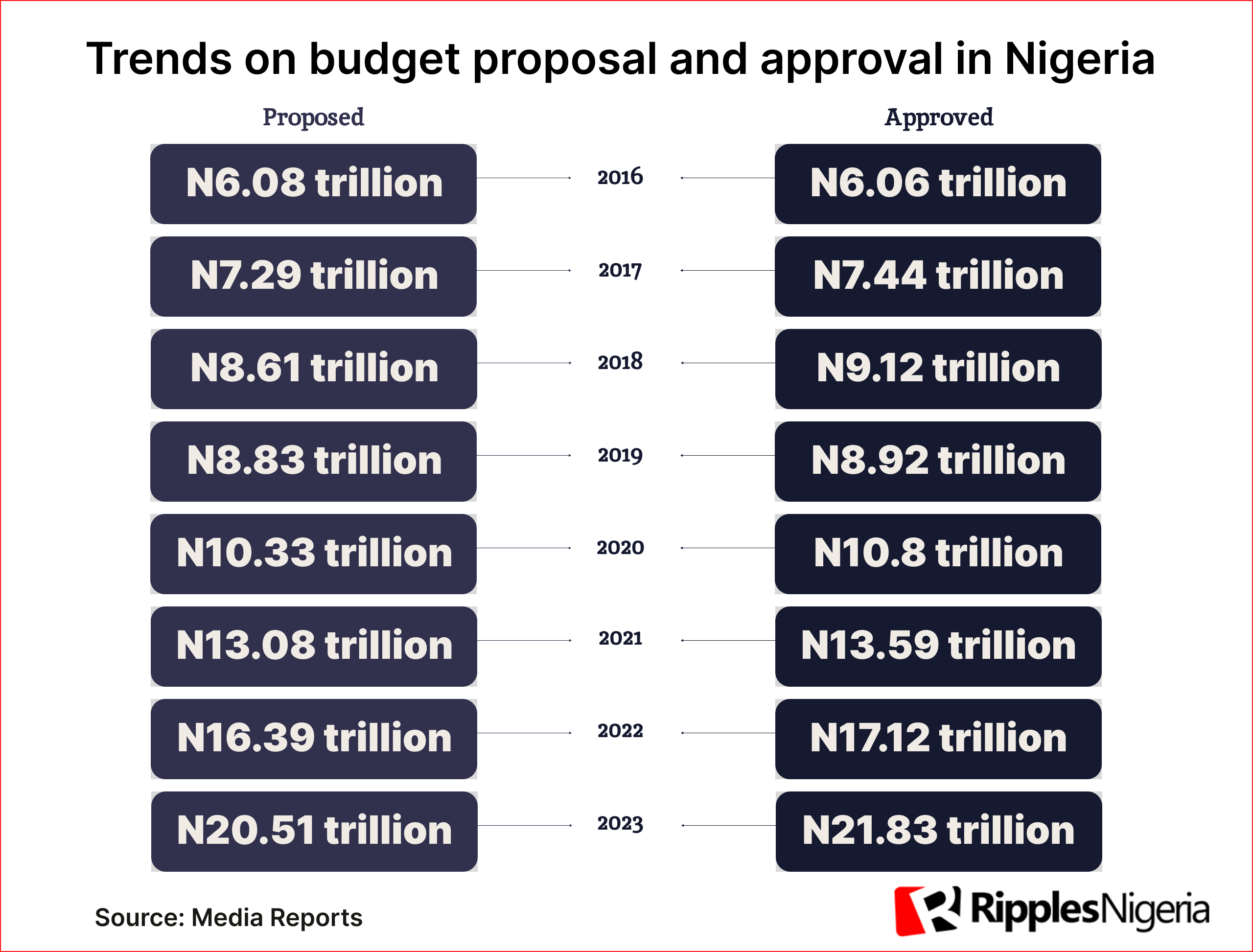Ripples Metrics
RipplesMetrics: Trends on budget proposal and approval in Nigeria

Section 81 of the Nigerian 1999 constitution (as amended) provides that one of the responsibilities of the president is to prepare the annual expenditure for every financial year and pass it to the National Assembly for approval.
The constitution further states that “The heads of expenditure contained in the estimates (other than expenditure charged upon the Consolidated Revenue Fund of the Federation by this Constitution) shall be included in a bill, to be known as an Appropriation Bill, providing for the issue from the Consolidated Revenue Fund of the sums necessary to meet that expenditure and the appropriation of those sums for the purposes specified therein.”
Going by this authorization, President Bola Tinubu on Wednesday presented his first appropriation bill to a joint session of the National Assembly which is estimated to be in the tune of N27.5 trillion for the 2024 fiscal year.
This amount followed the approval granted by the Federal Executive Council on November 27. The amount had increased from N26.01 trillion earlier proposed by the council.
However, RipplesMetirc observed that over the past eight years, there have been increases in the budget proposed and submitted by the president compared to what is approved after the National Assembly has reviewed it.
This report highlights the trends between the budget amount proposed and what was approved.
Budget passed between 2015 and 2023
When former president, Muhammadu Buhari came to power in 2015, he inherited N4.5 trillion from his predecessor, Goodluck Jonathan. This was higher than the N4.4 trillion earlier presented to the National Assembly.
READ ALSO:RipplesMetrics: Examining the number of probes by the National Assembly
After Buhari got into power in May 2015, he promised to present every fiscal budget before the working year. His first presentation was in December with N6.08 trillion for the 2016 fiscal year. The Assembly reduced 0.33 per cent to N6.06 trillion. This was the only time a budget proposal was reduced under his administration.
The 2017 N7.298 trillion budget for economic growth was presented in December 2016. However, the National Assembly increased it by 1.95 per cent to N7.44 trillion.
Similarly, the 2018 fiscal budget was increased by 5.9 per cent to N9.12 trillion from N8.612 trillion presented by the president. Also in 2019, the budget was increased by 0.91 per cent to N8.92 trillion from N8.83 trillion presented by the president.
When Buhari returned to power for a second term in office, he presented N10.33 trillion as the budget for 2020. However, the outbreak of the COVID-19 pandemic made the National Assembly increase the budget from N10.59 trillion to N10.8 trillion to accommodate additional expenses in the health sector.
In 2021, N13.08 trillion was presented by the president but it was increased by 3.9 per cent to N13.59 trillion. Also, the trajectory continued in 2022 when the president presented N16.39 trillion but was increased by 4.45 per cent to N17.12 trillion.
The final budget presented by Buhari was N20.51 trillion and was increased by 6.44 per cent to N21.83 trillion.
With the new president making his presentation, there are speculations that the final approval might increase above the proposed amount.
By James Odunayo
Join the conversation
Support Ripples Nigeria, hold up solutions journalism
Balanced, fearless journalism driven by data comes at huge financial costs.
As a media platform, we hold leadership accountable and will not trade the right to press freedom and free speech for a piece of cake.
If you like what we do, and are ready to uphold solutions journalism, kindly donate to the Ripples Nigeria cause.
Your support would help to ensure that citizens and institutions continue to have free access to credible and reliable information for societal development.






















